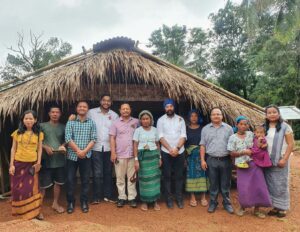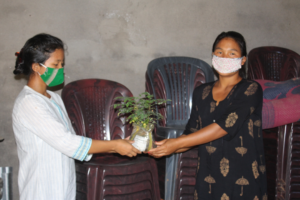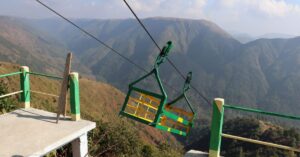Written by Jason Iangrai and Cheatchi Norah Momin
The Mei-Ramew State Agroecology Cooperative Society successfully launched its first Farmers’ Market in Ladmawphlang on September 27, 2024. The event brought together farmers from various communities in the region, providing them with a platform to showcase and sell their organic, chemical-free produce. The market was a collaborative effort between NESFAS, Cooperative society and partner villages which included Ladmawphlang, Laitsohpliah, Mawstep, Pyrda, Mawbri, Laitlyndop, Nongpriang, Nongtraw, Dewlieh, Mawmihthied, and Kshaid. The market featured a wide variety of organic products, including Sha Shiah Krot (root tea), Rosella jam, bayberry pickle, Sohiong jam, and wild edibles like Jatira, Jasim, and Jamyrdoh.
Babu Richard Ranee, a school teacher from Nongtraw Village, emphasized the significance of this initiative, stating that the farmers’ market is a crucial step towards empowering rural farmers, promoting sustainable agriculture, and providing a much-needed platform for them to sell their produce and receive the recognition they deserve.
The event attracted numerous tourists visiting Sohra, who were delighted to discover this hidden gem and learn about the region’s unique agricultural heritage. Reema, a visitor from Mumbai, expressed her enthusiasm for the market and its contribution to preserving indigenous food systems. Congratulating the society and the farmers, she stated, “For people like us who come from the West of India, this is something new and to see organic and pure produce that is sourced from the communities itself is just great.
Bah Gavin Mylliem, the MLA of Sohra was the Chief Guest at the event. He expressed his delight on seeing tourists frequenting the indigenous café frequently. He extended his gratitude to NESFAS for promoting organic produce that has become a rare commodity in this day and age, which benefits rural farmers who are majorly dependent on farming and cultivation. He also stressed the need for collective action to protect and promote indigenous food systems and to ensure that there is balance in the demand and supply chain of organic produce.
Bah Momin, Sub-Registrar of Cooperative Society, Sohra was thrilled to witness the diverse array of traditional products on display, a true reflection of our rich cultural heritage. He noted the striking similarities between the fresh produce grown by the Khasi and Garo communities. “Given that the cooperative society is a relatively new endeavor, it has a promising start. I thank NESFAS for spearheading this successful initiative and hope it will set a precedent for future endeavors”, he commented.
Bah Shaiphar Dohling, Community Consultant at NESFAS thanked all the attendees and participants for their support. “We hope to decentralize these farmers’ markets and make them more accessible to farmers in rural areas,” he said. “This is just the beginning of a larger movement to promote indigenous food systems”, he added.
Babu Nestar Kharmawphlang, Chairperson of NESFAS, highlighted the importance of preserving biodiversity and utilizing organic produce to combat climate change. “Our ancestors used this natural bounty for their medicinal properties,” he said. “By supporting local farmers and promoting organic agriculture, we can reduce our reliance on external sources and contribute to a healthier planet.”
The success of the Farmers’ Market in Ladmawphlang is a testament to the growing interest in sustainable and locally sourced food. As the initiative continues to expand, it has the potential to significantly impact the livelihoods of farmers in the region and promote a healthier, more sustainable way of life.





